World Events
Part of our aim in the ‘Wellington Through The Decades’ project is to relate life at Wellington to the events of the wider world. We therefore asked our respondents specifically about their memories of current affairs during their time at College.

Aware or unaware?
Many OWs reported that they had not been particularly aware of world events during their Wellington years:
‘During my earlier years we did not pay too much attention to current affairs – too busy just surviving all the pressures put upon us.’ John Hoblyn (Hardinge 1945-50)
‘I think we were rather insulated from outside events.’ Norman Tyler (Hill 1947-52)
‘At that time my focus was entirely domestic: survival, food, and College life.’ Anonymous
‘I wasn’t aware of any world events. I was very uncritical and accepted everything without concern.’ Michael Hedgecoe (Combermere 1951-54)
‘World events meant nothing to me.’
Robin Lake (Benson 1952-57)
‘I cannot really remember being impinged by world affairs, which is a sad reflection upon me and, to some extent, College.’ Stuart Dowding (Talbot 1957-61)
Some did recall certain events which made an impact, but said that these had still felt rather distant:
‘Despite the tensions of Cold War confrontation, we were somewhat insulated from world affairs. We took it for granted that Britain still had a significant part to play in world security and a colonial empire to defend; large areas of the globes in our geography lessons were, after all, coloured red. There was little interest in the countries of continental Europe, still picking themselves up from the War.’ Alan Munro (Talbot 1948-53)
‘I have few memories of major world events while I was there. The ‘space race’ was just starting, with exciting photographs and diagrams, but I don’t remember having any current affairs lessons or lectures. Films in the theatre, newspapers in the common room, but we seemed strangely distant from the real world outside. Perhaps typical of public schools at that time.’ Andrew Dewar-Durie (Talbot 1953-56)
Others reported more awareness and interest in the outside world:
‘We were aware of the socialist government. In my later years there was much more teaching about current affairs and the international situation. As I neared the time when I would join the Army for National Service, I became very interested in the Korean War.’ John Hoblyn (Hardinge 1945-50)
‘In the main, the world outside had little direct impact on our lives, but family business and military connections and the international perspectives of our school population ensured that we maintained a keen interest in world affairs.’ Peter Rickards (Murray 1947-52)
‘We were all very involved with current events, and read the daily newspapers avidly.’
John Le Mare (Stanley 1950-55)
‘I was very interested in national and world events, and was reprimanded for speaking out in favour of the Royal Air Force and air power in an “Army school.”’ Hardy Stroud (Combermere 1950-55)
‘I always followed current affairs on the radio and in newspapers. On them I was very knowledgeable.’ Tim Shoosmith (Blucher 1953-57)
‘I always kept well informed. In the World Affairs paper in my selection for Sandhurst, I got 95%. The Brigadier was horrified. I got it all from the Daily Express and he thought I was taking the piss out of him.’ Michael Campbell (Hill 1954-59)
What media?
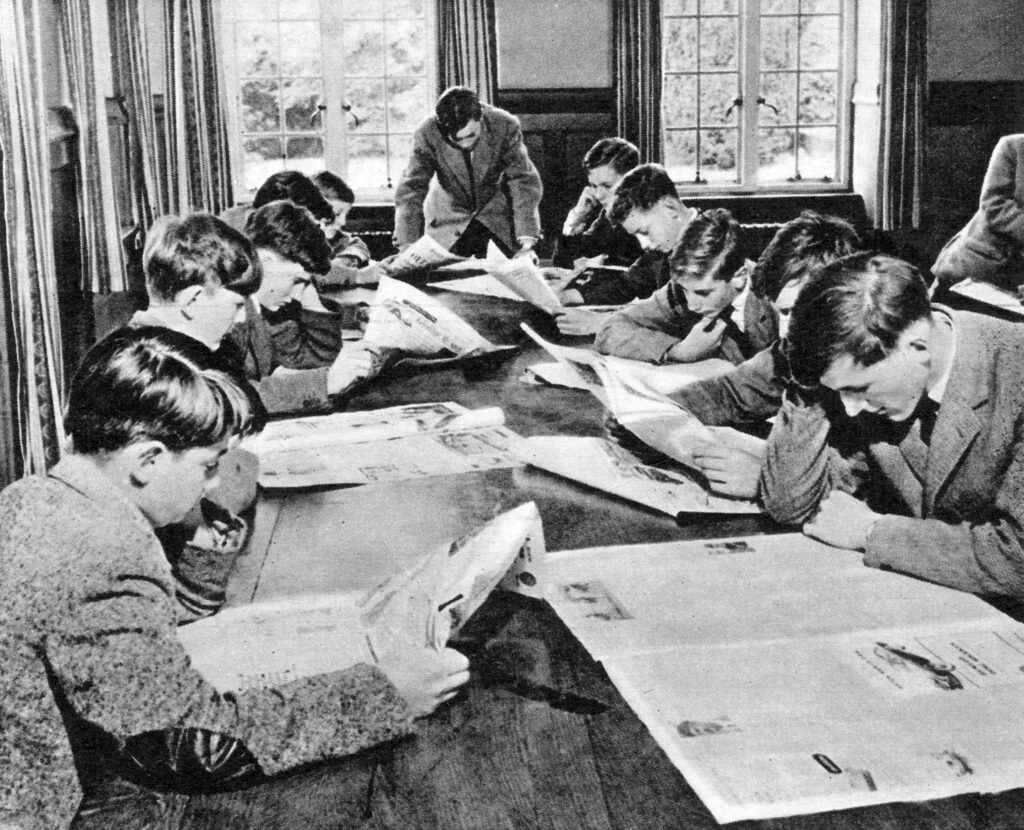
The main ways of keeping up with the news during the 1940s and 1950s were newspapers and the radio, and these were mentioned by many. Some could recall when or what they read:
‘There was a House subscription to a few papers, including the Telegraph, Daily Sketch and also the Spectator.’
Alan Munro (Talbot 1948-53)
‘We had some of the broadsheets every day in House, but no tabloids as I recall. We always had a copy of the Illustrated London News, and there was great excitement when Wellington College featured in one edition, together with a (posed) photo of us Talbot boys studiously reading the daily papers.’ Stuart Dowding (Talbot 1957-61)
‘I used to read the newspapers whilst everyone was in Chapel (as a Roman Catholic I did not attend the daily service).’ Michael Mathew (Murray 1956-60)
Television was just starting to have an impact, but was still a novelty:
‘There were the Olympic Games in London in 1948, but despite my interest in athletics, they didn’t impinge much on my consciousness – things were much quieter in a world without TV. In fact, during the summer holiday, I saw TV for the first time – some of my parents’ friends had a set, and invited all their neighbours to come and watch some of the Olympic events as they happened.’ Alastair Wilson (Talbot 1948-1950)
‘We were rather cocooned from world news due to lack of TV. On special occasions we were allowed to watch the TV in James Wort’s drawing room, flickering black-and-white.’
Anonymous
‘We bought a television. Only one programme, the BBC, and that twice a day, midday and evening. Before we had it, I occasionally watched that of a friend and recall that the National Anthem was always played at the end of each session. My friend’s father would insist we stood up when it was played.’ Nick Harding (Combermere) 1951-1955
The Second World War
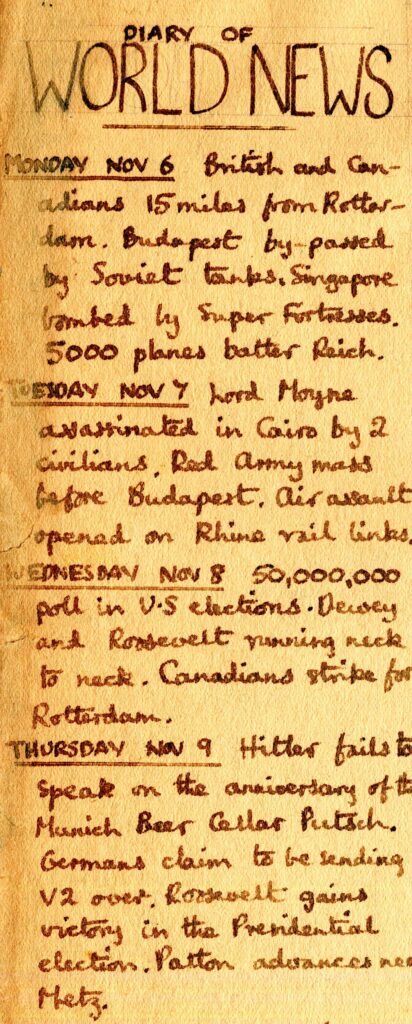
Those at College during the Second World War could not escape its impact, as described elsewhere within this project.
For some, this meant taking an interest in news reports:
‘We followed the progress of the War avidly in the newspapers and on the wireless.’
Peter Bell (Blucher 1943-48)
‘We plotted the progress of the War on a map, but it was a bit remote for smaller boys unless they had a relative fighting.’ John Flinn (Combermere 1944-49)
But sometimes the events came much closer:
‘I was there at school for Dunkirk and was very concerned. We saw loads of evacuees coming through Crowthorne station, as the railway line ran through the school grounds.’ Stephen Goodall (Hardinge 1936-40)
‘A memory of the “phoney war” of late 1939 was a talk by two Polish officers about their experiences in the Polish campaign which brought us into the War. They were horsed cavalrymen, and one of their more hair-raising, and pathetic, stories was of charging German tanks on their horses.
A sadder moment occurred on the night in May 1940 when France surrendered. I was coming back to the Combermere through the Quad in the evening darkness, and as I approached the door to the ushers’ Common Room, a rather pathetic figure lurched out alone. It was Monseiur Alfred Noblet, dressed in his French Reserve officer’s uniform of blue tunic and trousers with red stripe and kepi. He was I think drunk and certainly in tears, so distressed and ashamed was he of France’s predicament. The episode impressed me at the time and remains a sad memory.’ Robert Longmore (Combermere 1938-43)
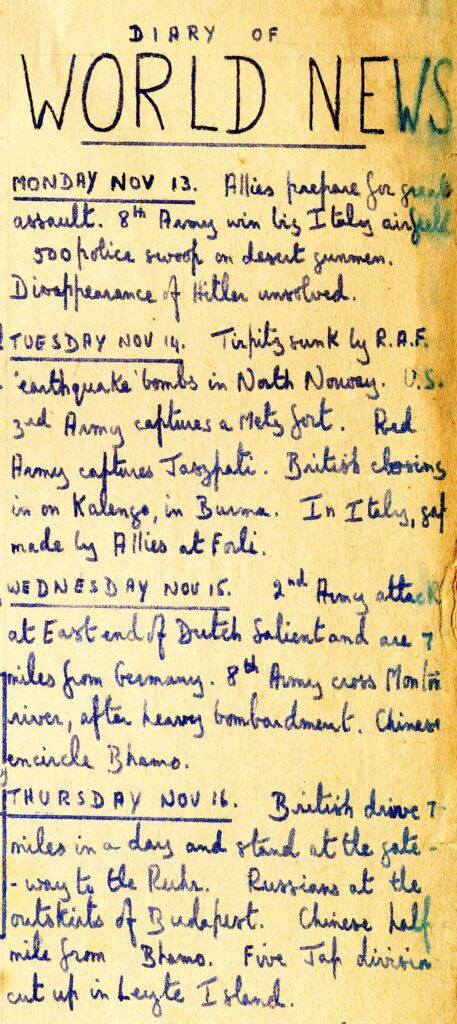
One event in particular made an impression on many:
‘I do recall seeing the air armada flying over College to France on D-Day.’ John Hornibrook (Murray 1942-46)
‘The most memorable day, without doubt, was D-Day, when we stood on South Front and saw hundreds of troop-carrying planes flying overhead. The feeling that the War was at last coming to an end was palpable.’
David Simonds (Orange 1941-46)
‘I remember seeing the RAF planes going overhead on D-Day, with the white and black stripes on their wings.’ Hugh Trevor (Hopetoun 1943-48)
‘The most notable thing I remember on D-Day morning is the mass of spirals of aircraft rising into the air that one saw in almost every direction. Until then I had taken the comparatively small numbers of both hostile and friendly aircraft for granted and had not realised quite how many airfields there were nearby. It was a really amazing sight that has always stuck in my mind.’ Christopher Beeton (Talbot 1943-47)
On the other hand, Hugh Trevor (Hopetoun 1943-48) seems to speak for the majority when he writes:
‘I don’t remember anything about VE Day. I suppose we were given a half-holiday, but I don’t remember anything.’
The Korean War and others
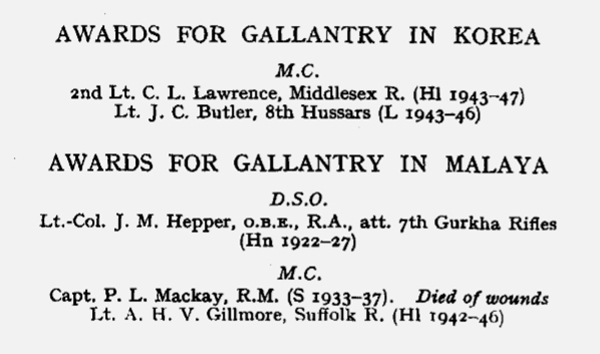
Although not on the scale of the Second World War, the Korean War still had a considerable impact at Wellington, as many pupils had relatives involved and faced the prospect of fighting there themselves.
‘There was considerable interest in the UK’s military role in the Korean War, in particular a savage battle with Chinese forces involving the “Glorious Gloucesters.”’ Alan Munro (Talbot 1948-53)
‘The only world event which really affected me was the Korean War, in which I had two much-liked cousins killed with the Argylls early in that conflict.’
John Watson (Benson 1946-51)
‘I remember the outbreak of the Korean War well, and being firmly hostile to Bolshevism, was much concerned with our relations towards the Soviet Union and Communist China.’ Nikolai Tolstoy-Miloslavsky (Stanley 1949-53)
‘The Korean War had little impact on my age group, although I do recall a visit by a former Dormitory member who had lost a leg there. The Mau Mau uprising also had little impact, although one Dormitory contemporary had parents in Kenya.’ William Field (Lynedoch 1952-56)
‘The Korean War was in full swing… Many of us who had chosen a military career realized that we might have to take part in this conflict. Previous OWs were already in action.’ Peter Rickards (Murray 1947-52)
‘With National Service in full swing, we all knew that soon after leaving College we would be called up and could be required to serve in an active service area. It was particularly on my mind as my elder brother was serving in Malaya.’ Richard Craven (Hill 1950-54)
‘At that time the Korean War was in progress, and I remember thinking that what I learnt in the Corps might be of more practical value than what I learnt in the classroom!’
Christopher Stephenson (Hill 1949-54)
Some were aware of other conflicts:
‘A number of us had relatives fighting in troublesome spots around the world. My uncle, a Lieutenant-Colonel in the Lancashire Fusiliers, was on the front of the Daily Mail for quelling a riot of Egyptian police and disarming them in Ismailia. He was quite short and was described as “diminutive but dynamic.”’ Anonymous
‘Our relationship with the USA was soured over the lack of progress in the formation of a two-state solution to the “Palestine question”. We were shocked by activities of the Israeli terrorist gangs Irgun, Hagannah and the Stern Gang. They were blowing up British military installations and terrorizing the Palestinians.’ Peter Rickards (Murray 1947-52
The Suez Crisis
The next event to make a strong impression on most Wellingtonians was the Suez crisis of 1956. An attempt to preserve British interests in the Middle East, the ultimate failure of this venture was later seen as a significant point in the decline of Britain’s global power.
‘I remember Suez, and a friend whose father was a senior Foreign Office worker told us how serious it was.’
William Young (Anglesey 1954-58)
‘There was certainly a great hoo-ha around Suez and some very opinionated comments from various ‘ushers’, which I now realize were rather prejudiced, although of their time.’ David Ward (Hopetoun 1954-58)
‘We took little interest in outside events. Suez was the main exception: I seem to remember most of us were in favour of British and French intervention and rather proud, in a jingoistic sort of way, of its initial success.’ Anthony Goodenough (Stanley 1954-59)
Some remembered that the event influenced Corps activity:
‘I remember Suez because we were well briefed for the CCF, and in my case the Naval Section, and I followed the crisis closely.’ Roger Pinhey (Hopetoun 1952-57)
‘During the Suez crisis the Corps was marched into the Duke of Wellington Barracks to replace some of the regulars who had been sent to the Middle East. Was this to confuse possible spies?’ Randal Stewart (Anglesey 1953-56)
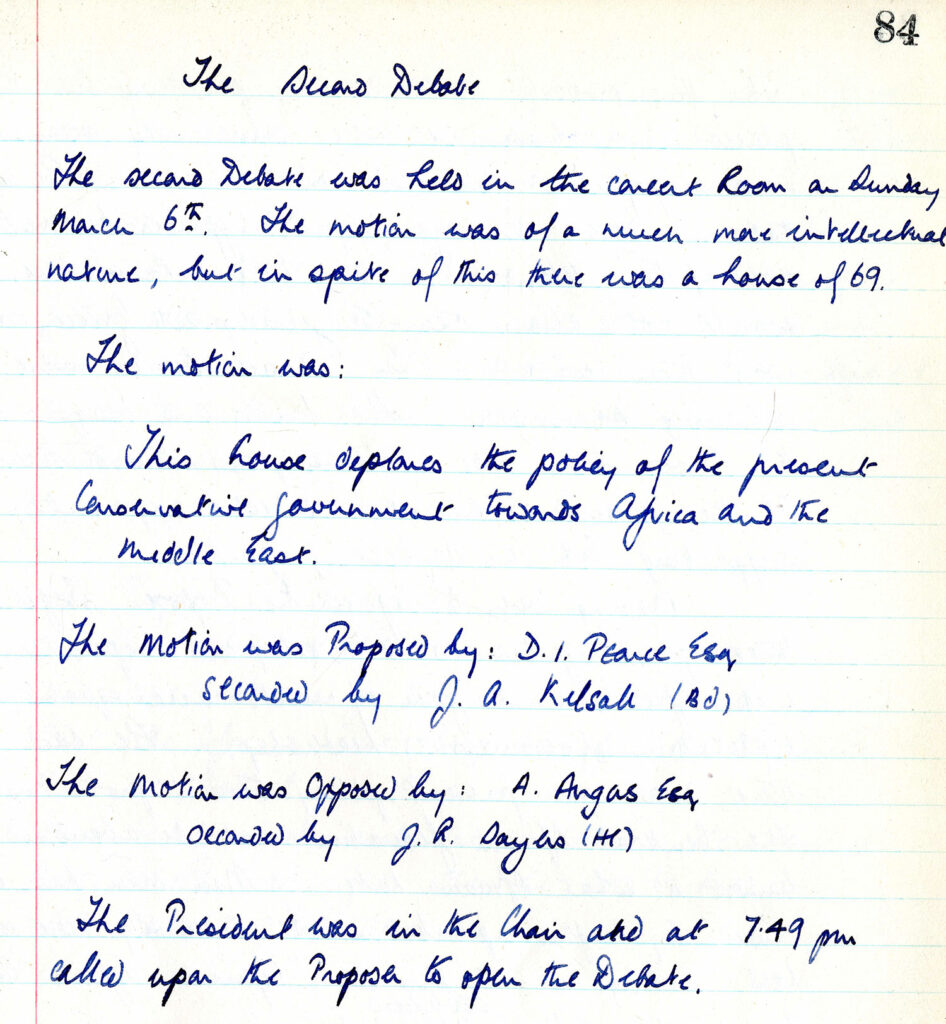
The Canal was very important for the transport of oil. John Berkley-Matthews (Combermere 1954-58) recalled that ‘before Suez, there was an oil shortage and baths were marked with a black line giving a depth of some 2 inches only!’
Michael Mathew (Murray 1956-60) remembered being ‘struck by Britain’s capitulation’ in Suez, but Christopher Miers (Beresford 1955-59) felt that at the time he ‘did not realise what a very significant event it was.’ For Graeme Shelford (Hardinge 1954-57), however, the crisis had a huge personal impact:
‘World events put a premature end to my time at Wellington. My parents had bought a mansion in Cornwall and ran it as a hotel… they were struggling financially to make it successful. 1956 was their first good year, but that was the year Anthony Eden invaded Suez. The resultant petrol rationing had a catastrophic effect on holiday traffic to Cornwall. To avoid bankruptcy, my parents had to sell out and could not pay my school fees. I had just passed my O-levels, so I was taken out of Wellington at 16 and enrolled in an engineering apprenticeship in Coventry.’
The Cold War
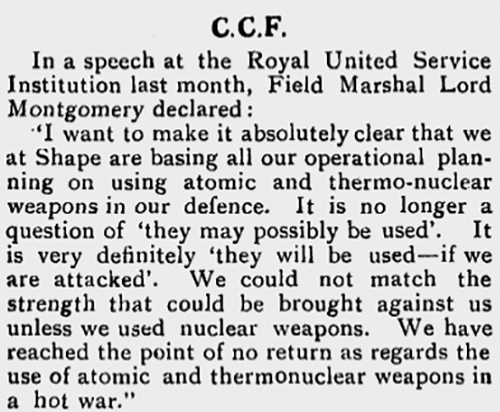
As with other events, accounts differ as to how much the antagonism between the Communist Bloc and the West impacted on Wellingtonians. Particularly earlier in our period, the effect seemed slight:
‘We were not impacted much by the Cold War, as that and the nuclear arms race all really took hold rather later.’ Anthony Bruce (Benson 1951-56)
‘I was not overly concerned about the nuclear arms race, which appeared unavoidable in the circumstances.’
Nikolai Tolstoy-Miloslavsky (Stanley 1949-53)
However, Rodney Fletcher (Combermere 1949-53) recalled that ‘Russia’s strength was frightening.’ John Alexander (Talbot 1954-58) wrote:
‘Certainly, we were all very aware of the Cold War and were pretty convinced there would be a Third World War, which made us pretty anxious. We were of the age, and the fact that we had been to Wellington meant that we would be the first to be called up.’
And William Young (Anglesey 1954-58) remembered:
‘My stepfather was in Berlin, and involved in the active management of intelligence agents in East Germany. As such I had a close and unique exposure to the Cold War, but it was not something to discuss at school.’
Politics
A few of our respondents remembered the political situation in Britain:
‘The big surprise was the result of the General Election in 1945 when the Labour Party was elected. I remember being terribly shocked when one of my friends told me that his father had voted Labour!’ John Hoblyn (Hardinge 1945-50)
‘When I first went to Wellington, Clement Attlee was still Prime Minister, but then there was a General Election which Winston Churchill won. Most Wellington College pupils, ushers and staff were very pro-Churchill as we all admired him after winning WW2.’
Anonymous
‘In my last year I became increasingly conscious of the political world; and, as Secretary of the Debating Society, organised a College-wide mock election at the time of the national General Election in October 1959. The Wellington election was won by the Liberal candidate, largely because he was something of a showman and a better public speaker than his opponents.’ Anthony Goodenough (Stanley 1954-59)
The death of King George VI
A sad event of which no Wellingtonian would have been unaware was the death of King George VI on 6 February 1952. Several remembered exactly how they heard the news:
‘The announcement was made to a shocked College in Hall that the King had died during the night.’ Tim Thompson (Lynedoch 1950-54)
‘I can still recall the announcement at lunch by the duty usher that the king had died.’ William Field (Lynedoch 1952-56)
‘I was in Front Quad when the news came through that King George VI had died. It was a great shock.’
Bertram Rope (Picton 1949-54)
‘I remember vividly the death of the King. I was making my way between lessons towards Mr Aglen’s classroom in one of the old “Tin Tab” buildings. One boy stubbornly refused to believe the news. I remember our Head of House telling us that just because the King had died, there was no need for everyone to go round with a long face.’ Douglas Miller (Benson 1951-56)
‘I clearly recall sitting in Doug Young’s French class on 6 February 1952 when the door opened and the Master, Harry House, entered. As was custom, we all immediately stood up. Harry House announced with the greatest regret that the King, George VI, had died at Sandringham.
We were all deeply saddened… It is perhaps difficult for those who were not alive at the time to understand the love and esteem in which the Royal family was held after the war, and most specifically the King.’ Roger Ryall (Picton 1951-56)
The King’s death was of course followed by his funeral, an event in which the Wellington CCF was privileged to play a part. Memories of this, and of other royal occasions, can be found on the page ‘Visits, VIPs and Royalty.’
Minor events
As well as these major news stories, some of our respondents mentioned other events they remembered, perhaps ones which had particularly piqued their interest:
‘I remember our House Tutor telling us of Prince Charles being born.’ Hugh Trevor (Hopetoun 1943-48)
‘Since Sir Frank Whittle and Rolls Royce had perfected the jet engine, British aircraft designers were leading the world. We were fortunate to live so close to Farnborough, where the Royal Aircraft Establishment tested the latest military and civilian designs. We saw many of the latest military aircraft before they were publicly announced.’ Peter Rickards (Murray 1947-52)
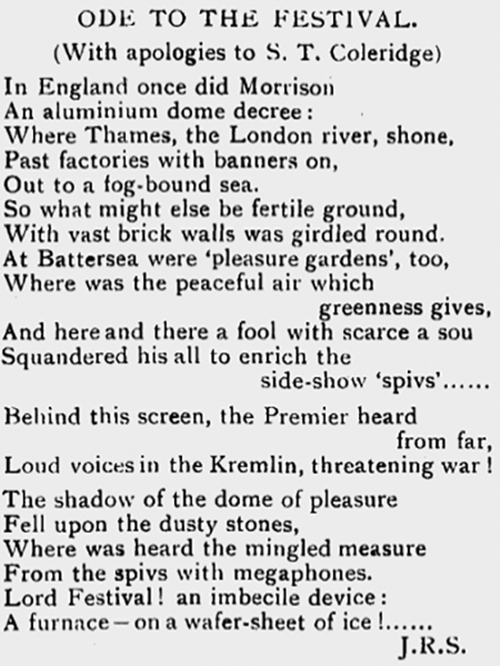
‘Another memorable event in those despondent years was the impressive Festival of Britain in 1951, along with its funfair in Battersea Park.’ Alan Munro (Talbot 1948-53)
‘In May 1951 we had the Festival of Britain, which seemed to highlight the fact that World War Two was really over and we could get on with the peace.’ Richard Craven (Hill 1950-54)
Richard Craven (Hill 1950-54)
‘The 1952 lengthy drama of the ship “Flying Enterprise” and Captain Carlsen, and the 1953 sinking of the ferry “Princess Victoria” in the Irish Sea.’ Anonymous
‘Another strange occasion was when several of us bicycled over to Ascot where we hoped to get a glimpse – along with the press photographers – of Princess Margaret and/or Captain Peter Townsend, who at that time were pursuing doomed hopes of getting married.’ Anthony Bruce (Benson 1951-56)
‘The 1957 Asian flu epidemic flattened most of the population, and I spent a week in the Talbot, which had been converted into a sanitorium, listening to the radio reports of the Soviet Sputnik satellite launch.’ Ross Mallock (Murray 1954-59)
‘The only international crisis which impinged much upon me was the political crisis in France in 1958, which excited Fergus Russell considerably. He invited several of us into his study to listen to radio accounts of this.’ Christopher Birt (Beresford 1955-60)
By the end of the decade, things were becoming a little racier:
‘I remember the fuss over the Lady Chatterley trial [in 1960] and us all seeking a copy (page 58, I seem to remember). The inception of the Mini and the E-Type Jaguar were also greeted with much enthusiasm.’
Stuart Dowding (Talbot 1957-61)
Closer to home
Some events were memorable because they took place close to Wellington, or even involved the College. Allen Molesworth (Blucher 1945-48) was there for one of these:
‘The only major event of which I have a memory was when a gang of three or four boys took to “breaking and entering” and stealing from local houses as an extra-curricular activity. After some initial success they were apprehended and appropriately dealt with.’
This dark episode in the College’s history resulted in a spate of expulsions.
The proximity of Broadmoor secure hospital led to more than one memorable episode. The first was the escape of murderer John Straffen in 1952:
‘We were all having our breakfast when a great bell was heard tolling across the countryside. This was coming from Broadmoor and indicated that there had been an escape. In a short time, telephones began to ring and we were assembled in front of our Dormitory Tutor. We were told that the infamous Straffen had escaped and could be hiding in the grounds of Wellington.
We were told to change into our Corps kit and assemble outside the Armoury in our platoons. There, we were each issued with a .303 Lee Enfield rifle and a clip of blank ammunition. Each platoon was given a section of the 400-acre grounds to “sweep” in the search for Straffen. What we were supposed to do if we found him was not clear.’ Roger Ryall (Picton 1951-56)
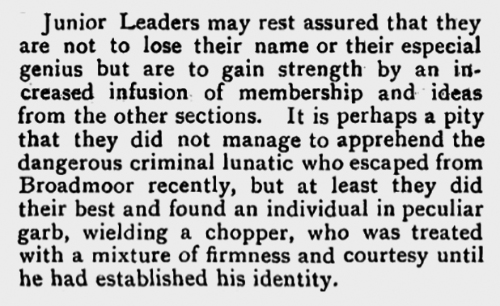
The later 1950s saw another escape, that of the ‘Mad Axeman’ Frank Mitchell, an associate of the Kray twins:
‘On one occasion, College grounds suddenly sprouted military personnel manning classic barbed-wire-and-timber roadblocks. It later materialised that “Mad Mitch,” as I believe he was called, had escaped. The siren had not been sounded, so as not to cause alarm! He was recaptured but, I think, later was himself murdered.’ Richard May-Hill (Hopetoun 1957-61)
‘A boiling hot day in the middle of A-levels, when “The Mad Axeman” escaped from Broadmoor, and College went into “lockdown” as we would now know it. We stood on the Anglesey balcony, watching sweating troops beating through the grounds. He was I think eventually caught in Wokingham.’ Michael Peck (Anglesey 1954-59)
‘The only newsworthy item I remember was the escape of “The Mad Axeman” Frank Mitchell from Broadmoor in 1958. There were armed soldiers around the grounds, but I still had to walk (or jog) up to College in the dark from the Talbot.’
Adrian Stephenson (Talbot 1957-61)
‘We were given strict instructions to go back and forth to College in pairs –so that one of us might survive an encounter with “The Axe Man” to explain the other’s absence at callover, it was thought. On a Wednesday, Corps afternoon, when dressed in full kit, carrying his .303 rifle in one of the woods, another boy came face to face with a man carrying an axe. A witness to the speed of his retreat said it outclassed that of anyone, and wished he had had a stopwatch to verify its speed. The innocent forester was unharmed.’ John Green (Talbot 1954-58)
But perhaps the most unusual event of all was recounted by Peter Rickards (Murray 1947-52):
‘This was the height of the “Cold War” with the Soviet Union. It was also the most intense period of UFO reports. One day I recall a grey-blue Land Rover, followed by an Army staff car, driving up to the North Front. A couple of officers and military policemen had come to investigate the report of a UFO sighting from the woods near the Talbot. Word had it that one of our own cohort had reported the sighting. The matter of UFOs was taken very seriously by military intelligence.’